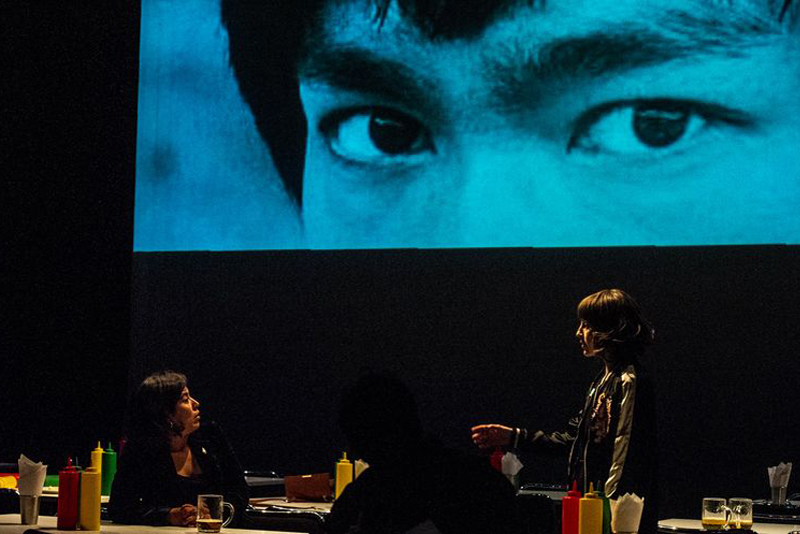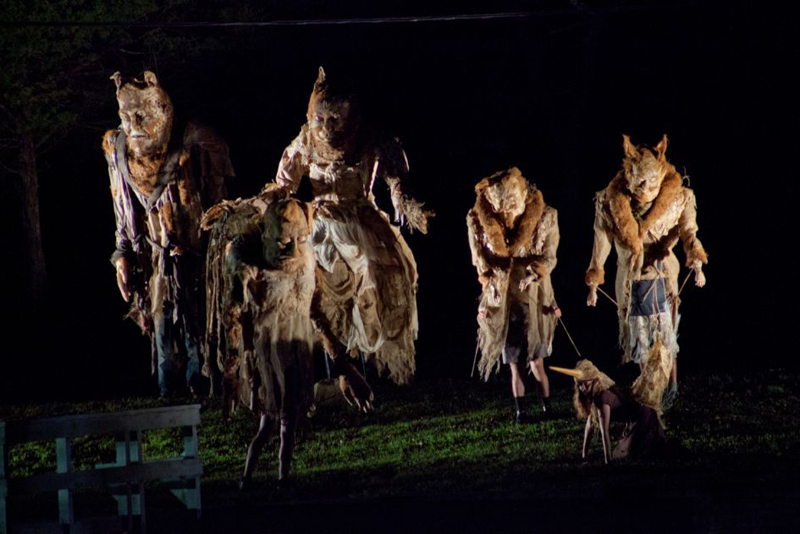Noorderzon Performing Arts Festival
Claudia Woolgar in the Netherlands
1 September 2019
The Edinburgh Festival dominates the European summer cultural scene with its rich programme and world-renowned performers but there are other theatre festivals closer to my Dutch home to tell my Plays International & Europe readers about, so I decided to pay a visit to the 29th edition of the Noorderzon Performing Arts Festival in the student city of Groningen, situated in the very north of the Netherlands.
The festival takes place every year in August; it colonizes the central park of the city with tents, music, performance, food and drink — a delightful and magical place when the sun goes down and the lights by the lake and under the trees turn on. The atmosphere is celebratory and totally family- friendly. I am convinced that Edinburgh has nothing to match it.
The theatre programme takes place in the city centre and, to some extent, in tents in the park. The city is compact enough to cycle round, so I hired a bike from the train station, negotiated my way through the hideous forecourt of Groningen railway station and cycled through pretty, narrow streets into the busy heart of the city.
My first step into the festival was quirky to say the least. More visual art installation than theatre —although billed as the latter — I Once Entered A Garden took place at the very top of an old water tower which is luckily serviced by a lift. I gazed out over the roofs of the city to see parks, beautiful gardens, and roof terraces before turning my back on it all and diving into the dark of the water tower: a round metal room with eight focus points around the walls and a mannequin in a white wedding dress in the centre.

The cast of Dragón. Photo credit: Pierre Borasci.
Created by the Syrian-Palestinian set designer Bissane al-Charif and Syrian director Wael Ali, this was a delightful but voyeuristic sharing of emotional and sexual awakening inspired by the Syrian singer Ashmahan’s song “I Once Entered a Garden”. Headphones permitted us to hear a voice conspiratorially recounting in Arabic, stories of the youthful discovery of sex and love in the Middle East. Billed as multi-media, the installation was frustratingly static. Additionally, while I had a Dutch translation of the confessional stories told which I could read in tandem with the Arabic, the disconnect between a language I do not speak and the long texts I had to read stole any chance of absorbing the personal reflections I was privileged to peek into.
But now that I reflect further, I Once Entered a Garden worked because of the ridiculous surprise I felt to discover that young people living in Islamic society —in some stories in the midst of a warzone — also discover sex and love like any other young person around the globe. How silly. Of course they do. And the sometimes hilarious steps they took to safeguard their virginity (such as the wearing of a glamorous swimsuit under their clothes to confound any wandering hands) were a touching link with any young teenage girl’s voyage of sexual discovery. Many of the stories ended with an almost universal question: what if my past had been different? The video installation of a woman’s face being washed away by water like ink on blotting paper was a fitting image for how all of us see our youthfulness eroded by time, memory and the choices we make.
My next stop was one of my favourite theatre companies: Rimini Protokoll (Stefan Kaegi) working with the Münchner Kammerspiele in a piece called Uncanny Valley. The title refers to the uncomfortable feeling we get when robots too closely resemble humans. And the piece was a mesmerizing exploration of the relationship between humans and machines. Kaegi entered this “frightening valley” and found author and playwright Thomas Melle who was prepared to have an exact robot copy of himself made. As the lights came up, we saw a man seated on a chair, one leg crossed over another, a small table with a laptop on it by his side. A video screen stretched across the empty stage. As the man started to talk, I realized this was no human but a robot which looked uncannily like a human. The robot Melle had replaced the human Melle on stage.

Du Lei and Liu Mei in Constellations.
Photo courtesy Théâtre du Rêve Expérimental.
His voice was rather deadpan, but his face was so human and his reflections often so disturbing that I found myself caught up in his philosophical monologue and pondering a (potential) future world which was, indeed, uncomfortable. Melle suffers from acute shyness — a phobia of giving interviews and wandering around the world. So Melle the man had given his words and reflections to his robot: the ultimate vanishing trick that would allow us all to wander the earth from the safety of our homes. Melles’ core visual example of the pre-programmed world at our fingertips was the computerized use of moving lights in the theatre. But as a video showed Melle the man being cast, and the cast becoming Melle the robot, cables and connection boxes open for view at the back of his head, it was not the computerized moving light which haunted me but his (Melle the robot’s) words: “And you will now applaud. Because you are programmed to applaud”. A fascinating and yet again an uncomfortable voyeuristic experience.
Dragón from Guillermo Calderón, one of Chile’s leading writers and directors, was next on my list. What a striking piece to see after Uncanny Valley. The stage was set as an empty canteen, and in this cold environment we witnessed the rantings and dreams of a group of politically active artists, the Dragón Group. It was often hilarious in its naive juxtaposition of idealism and reality, with videos of ’70s style “happenings” gone wrong on the streets of Santiago. But the presence of a self-exiled member of the group in disguise as a new recruit in a twist in the text was so unbelievable as to seriously weaken the piece. The acting felt forced and uncomfortable — but then the message, at an international theatre festival, was also difficult to stomach: art is bourgeois, art betrays real issues, there is a thin line between fake news and aesthetic fake shock tactics to change society; art lies and cheats. Where is Melles’ robot in this confused theatrical world?

The Chekhov Project. Photo credit: Miklos Buk.
Again, slightly off the traditional theatre track, the next day I boarded a boat for a film screening called The Chekhov Project coming from New York. It was pure Anton Chekhov in that inspired way Chekhov has of showing the tragedy at the heart of the idle, indulgent bourgeoisie — but it was a film, not theatre. A film about theatre. A group of award-winning actors, writers, musicians, cooks and costume designers gathers every summer to make a one-off theatre show for the local community on an old farm by a lake. To overcome the limited audience reach, director Brian Mertes decided to film the process, and the result is a beautiful engrossing film, theatre performance, rehearsal documentary, audience reaction … experience. Sometimes it is not clear what is performance, what is rehearsal and what might possibly be just film. As the inevitable Chekhov tragedy approaches, the community audience becomes increasingly invisible; the lines between reality, theatre and film blur. The sun blinded me as I came up from the hold and onto deck. It was like a window had shattered, and as I crossed the gangplank I felt disappointed by the single form of the world around me. Had I been cheated by this film/theatre collage or by the real world?
And so, on to Constellations from China (Wang Chong and Théâtre du Rêve Expérimental). An award-winning play by British author Nick Payne that opened at the Royal Court Theatre in 2012, Constellations is at one level a simple love story: boy (professional beekeeper Du Lei) meets girl (cosmologist Liu Mei.) They fall in love, fall out of love. But directed by Wang Chong and set on a starkly-lit circle in the middle of the stage with twelve different cameras filming the action live and projecting it onto a huge screen, it was far from simple. The cameras create parallel worlds where snippets of conversation between Du Lei and Lui Mei are repeated, altered in tone, shifted in focus. Outcomes become different.
Mid-stage, a hamster in a cage made up entirely of a hamster-wheel slept throughout the show. Not, I think, intended as the hamster had been billed, with another (absent) hamster, as representing God and Time. Never work with animals they say — and certainly don’t cast them in such key roles. But sleeping hamsters aside, the constantly repeated story and its different nuances and outcomes were frustrating — and yet also hypnotic. Boring — and yet also transfixing. Which camera, which world was the real one? Any of the multiple scenes I had witnessed? Or the final repeated scene in which only Lui Mei’s voice is heard (since she is dead) and during which Du Lei still dances a directed, pre-programmed dance from camera to camera?
It had been an extraordinary collection of shows. I had not chosen on the basis of their shared themes, nor expected to experience such a recurring quest for what is real and what is art. Actually, it was less seeking than a peeling away, an undermining, a questioning through forms of theatre that were, none of them, pure theatre. It is the role of art to question. It is the role of theatre to make us feel. Discomfort. Surprise. Confusion. And it is our role to applaud. Applaud for Noorderzon. Applause. Applause.









